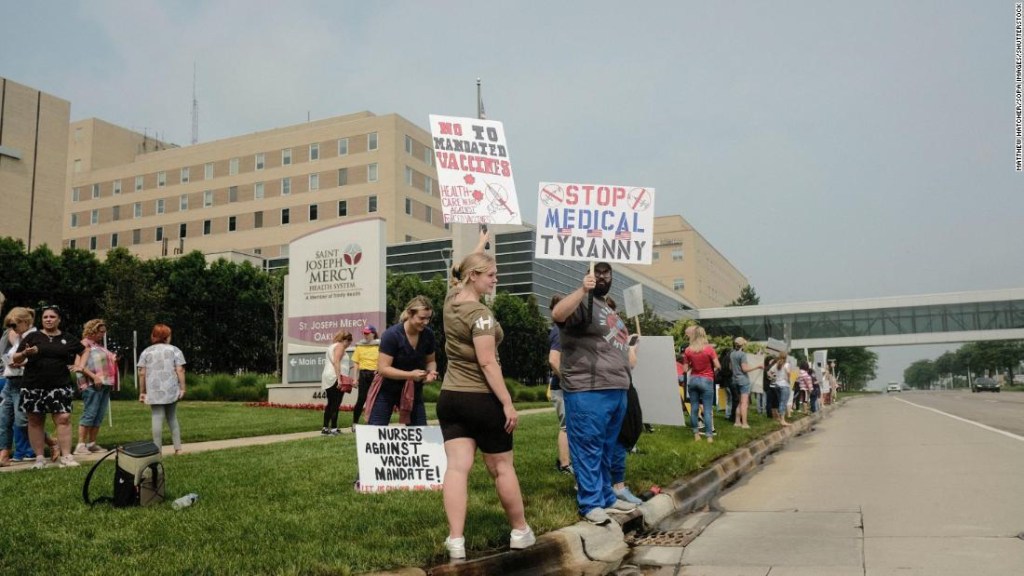500,000 daily cases of covid-19 predicted in the US 0:48
Editor's Note:
KHN (Kaiser Health News) is a national newsroom that produces in-depth journalism on health issues.
Along with Policy Analysis and Polling, KHN is one of the three main operational programs of KFF (Kaiser Family Foundation).
KFF is a nonprofit organization that provides health information to the nation.
(CNN) -
With the delta variant advancing, a growing number of employers are growing weary of just persuading workers to get vaccinated and are following President Joe Biden's protocol for federal workers: Either they show a proof of vaccination, or put on a mask and undergo regular tests if they want to work on site.
The federal government, the nation's largest employer, will require unvaccinated employees to wear face masks while working and undergo regular testing, in addition to taking other precautions, such as maintaining physical distance from co-workers and restricting work travel. .
Several states, including Hawaii, California, Maryland, Virginia and Washington, also say that unvaccinated state workers must undergo regular testing.
Biden announced that federal employees should be vaccinated and proposed offering US $ 100 to those who get vaccinated against covid-19
On Wednesday, California Governor Gavin Newsom extended this mandate to teachers and all school employees, the first state to do so.
These programs, with their alternative testing, differ from direct immunization mandates, as required by some health organizations, including health personnel from the Department of Health and Human Services, hospitals, and the United States military.
Employers, fearing a backlash, frame politics as an option, and see both parts of the equation as effective in reducing the spread of COVID-19.
Do public health experts think this approach will be helpful?
advertising
The Director General of Health is concerned about complacency with covid-19 as cases increase and vaccinations are delayed
Everyone agrees that the best solution is universal vaccination.
In the absence of that, many argued that actions taken by employers will add a layer of protection, although to what extent remains to be seen.
Protesters gather outside St. Joseph Mercy Oakland Hospital in Pontiac, Michigan, on July 24.
Healthcare workers and others gathered at various Michigan hospitals to protest the recent requirement by the Trinity Health and Henry Ford Health systems that nurses and other healthcare workers be vaccinated against COVID-19.
The test results are "really just a partial view over time," said Dr. Gigi Kwik Gronvall, associate professor at the Johns Hopkins Bloomberg School of Public Health.
Not even daily tests, as was the norm in the Trump White House, without other measures like the use of masks, prevented staff from getting sick last fall.
And the daily tests are cumbersome and expensive.
Employers hope that the hassles required of not getting vaccinated in the workplace will encourage those who are reluctant to get vaccinated once and for all.
"It's a powerful push," said Dr. Georges Benjamin, executive director of the American Public Health Association.
But there are also challenges.
Here's what various experts say:
Universal vaccination remains the gold standard
Vaccinating everyone who qualifies is "the perfect way out of this whole situation," said Dr. Marcus Plescia, chief medical officer for the Association of State and Territorial Health Officials.
"But given the realities of the current situation, I think it's reasonable that employers and others who are setting vaccination requirements offer some accommodations."
But much depends, according to him and others, on how well the rules are enforced.
"If (unvaccinated) people wear masks all day at work, even in the break room, that alone is pretty strong," he said.
"When the evidence is added, it is an alternative that is going to have some value."
Microsoft will also require covid-19 vaccines for workers in US offices.
Some employers, he said, are reluctant to establish these types of regulations because they fear losing employees, especially in areas that already suffer from shortages, such as nursing homes.
This approach is somewhat based on an honor system
Some states, healthcare organizations and New York City say they will require proof of vaccination - a copy of the employee's vaccination certificate or a version uploaded to an app on the employee's phone.
But other employers say they will allow workers to self-declare that they have been vaccinated.
Cuomo Announces New York Healthcare Workers Should Get Covid-19 Vaccination
"There will be some people who will lie, no question," said Dr. William Schaffner, professor of medicine in the division of infectious diseases at Vanderbilt University School of Medicine in Nashville.
"That will raise annoyance and concern for vaccinated people," Schaffner said.
"They'll say, 'Wait, Charlie is here and he's not wearing a mask and we know he's not vaccinated.' People know that kind of thing about their coworkers."
There are other consequences.
There is an online traffic of buying counterfeit vaccination cards, designed to look like the authentic ones from the Centers for Disease Control and Prevention (CDC, for its acronym in English) even though this is illegal and can carry fines or even jail time, the FBI has warned.
Employers may also take disciplinary action against workers who falsely state that they have been vaccinated.
How to check your covid-19 vaccination status from your phone in the USA
As for the test results, it is not so clear how the honor system will be applied.
Some workers, especially those in healthcare organizations, may be able to get tested at the company.
Other companies may allow workers to seek (and pay for) external testing.
It is not known whether employers will allow the use of self-administered home tests.
And the type of test that companies require is important, as rapid antigen tests are not as reliable as standard versions of PCR.
To complicate matters, the growing demand for tests during the surge has led to long lines for both types of tests in some parts of the country, and results from the most accurate version of the PCR can take days.
Testing frequency will vary and may not be ideal
Many labor regulations, including those for federal workers, require weekly or biweekly testing.
It's enough?
It is difficult to give an exact answer.
Dr. Robert Wachter, professor and chair of the department of medicine at the University of California, San Francisco, prefers testing to be done twice a week, especially given the explosion of cases in many parts of the country.
"If you only test once a week, there will be some cases that will creep in," Wachter said.
"You could get tested on Monday, get infected on Tuesday, and you could infect someone else that Friday or Saturday."
California Will Require Regular Immunizations or Tests for Teachers and School Staff
Who pays?
Although some companies may bear the cost, at least initially, not all will.
And workers also shouldn't count on the tests being fully covered by their health insurance.
They may have to pay out of pocket for the tests required by the company.
"Generally, health insurance providers cover COVID-19 tests that are performed to diagnose or treat a patient, if the patient has symptoms or has been in contact with someone who has been diagnosed with COVID," says Kristine Grow, spokesperson for AHIP (America's Health Insurance Plans), the industry lobby group.
However, he noted that guidelines released last year by various federal agencies indicate that tests "performed for the detection of health and safety in the general workplace, for public health surveillance, or for any other purpose. not primarily intended for diagnosis or treatment "do not have to be covered by insurers.
Bottom line: Employees could have to go through a lot of hurdles to remain unvaccinated in the workplace.
"That will get upset very quickly for a lot of people," Schaffner said.
"That will push a lot of people to get out of that barrier and go over to the side of vaccination."
Vaccine against covid-19















